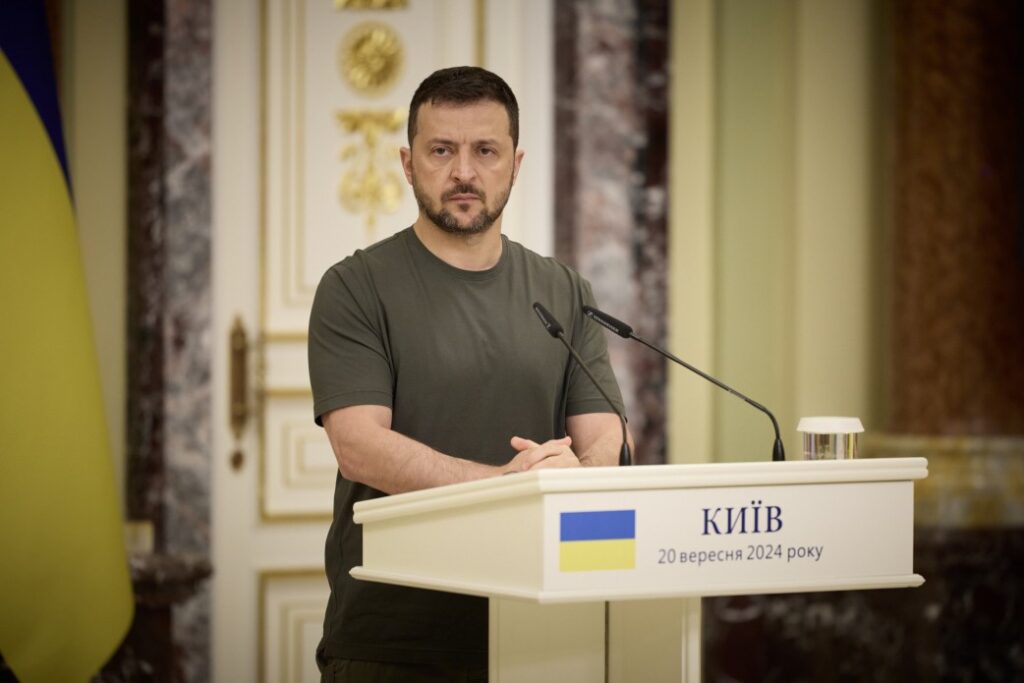Inside Ukraine’s covert program preparing Russia’s minorities for independence
While battling Russian aggression, Ukraine is quietly fostering a cadre of leaders poised to carve independent nations from Russia's vast, multiethnic territories.
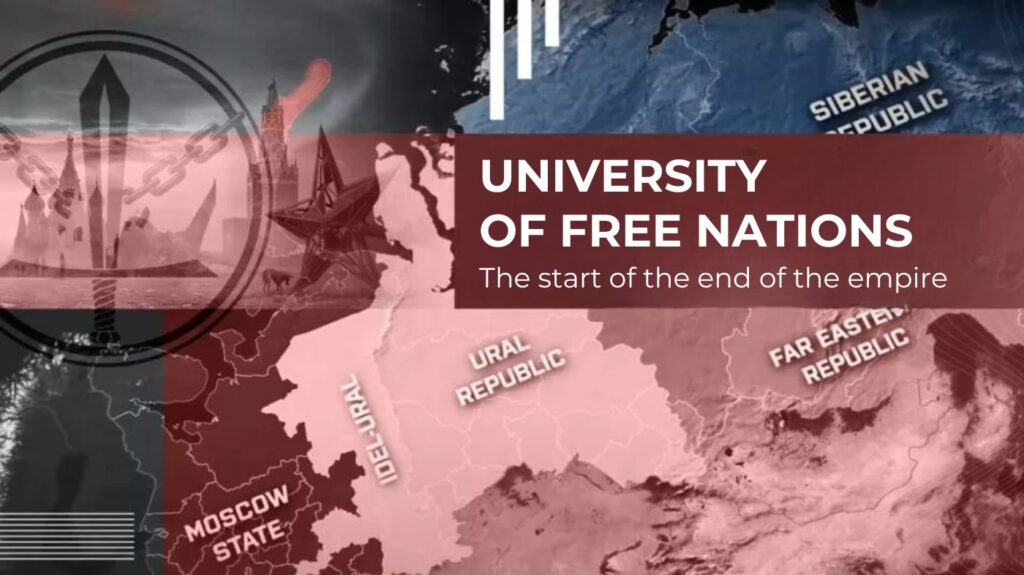

As Ukraine continues its third year of fighting against Russia’s full-scale invasion, the second cohort of leaders of nations subjugated by Russia is undertaking studies in national resistance fundamentals. The goal: the decolonization of Russia.
Ukraine has a long tradition of opposing Russia’s attempts at national erasure and has experience sharing resistance tactics with other nations. In 1943, during World War II, the Organization of Ukrainian Nationalists, which fought against both the Nazis and the Soviets, convened a conference in the forests. This gathering brought together representatives of various peoples subjugated by the Soviet Union.
This led to the formation of the Anti-Bolshevik Bloc of Nations, which operated effectively from the 1940s to the 1990s.
But Russia’s 2022 full-scale invasion led to the revival of the activities of the now Anti-Imperial Bloc of Nations. In 2023, this organization established the University of Free Nations that aims to support representatives of oppressed nations within Russia by educating them on the theory and practice of national liberation movements.
The inaugural class included activists from diverse civic organizations representing Chechens, Dagestanis, Ingush, Tatars, Bashkirs, Buryats, Yakuts, and Oirat-Kalmyks. The curriculum is delivered by prominent Ukrainian experts in liberation movements, legal scholars, economists, and other specialists. Due to security risks associated with activities in Russia, the first intake was limited to 20 students.
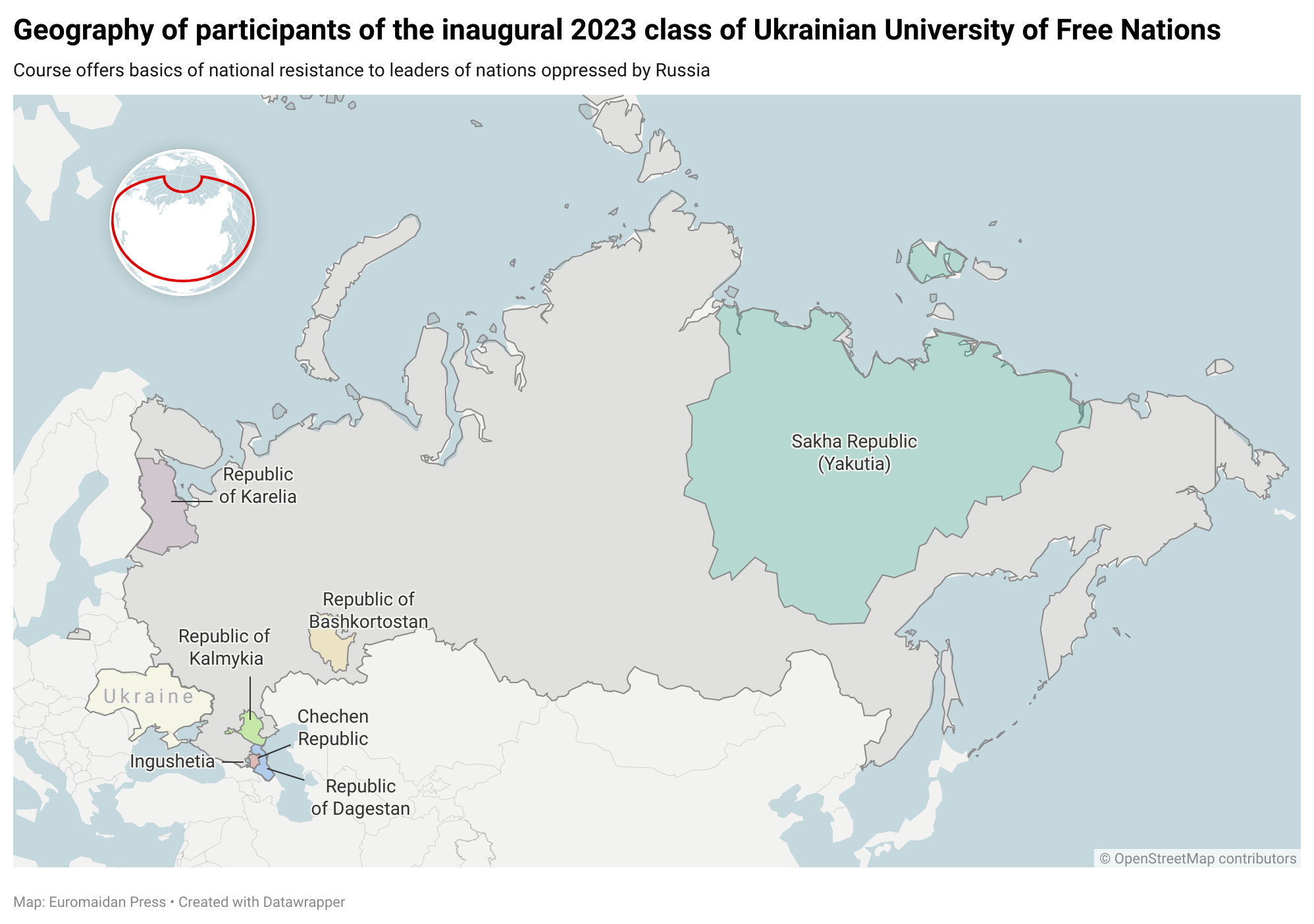
Ukraine’s university is no one-way street: since the start of Russia’s war, emigre leaders of Russia’s oppressed nations have held “Forums of post-Russia,” conferences that envision the future of Russia after its disintegration into nation-states.
In an exclusive interview, Leontiy Shypilov, the program director of the University of Free Nations, outlined the program’s goals and hurdles while also delving into possible futures for Russia’s diverse nations and their impending challenges.
How did you come up with the idea of the University of Free Nations?
We need to start with the existential conflict between Russia and the nations it has subjugated. Unfortunately, the nature of the Moscovite formation is such that it can only function through the expansion of its territory, imposing its state system, language, culture, and so on.
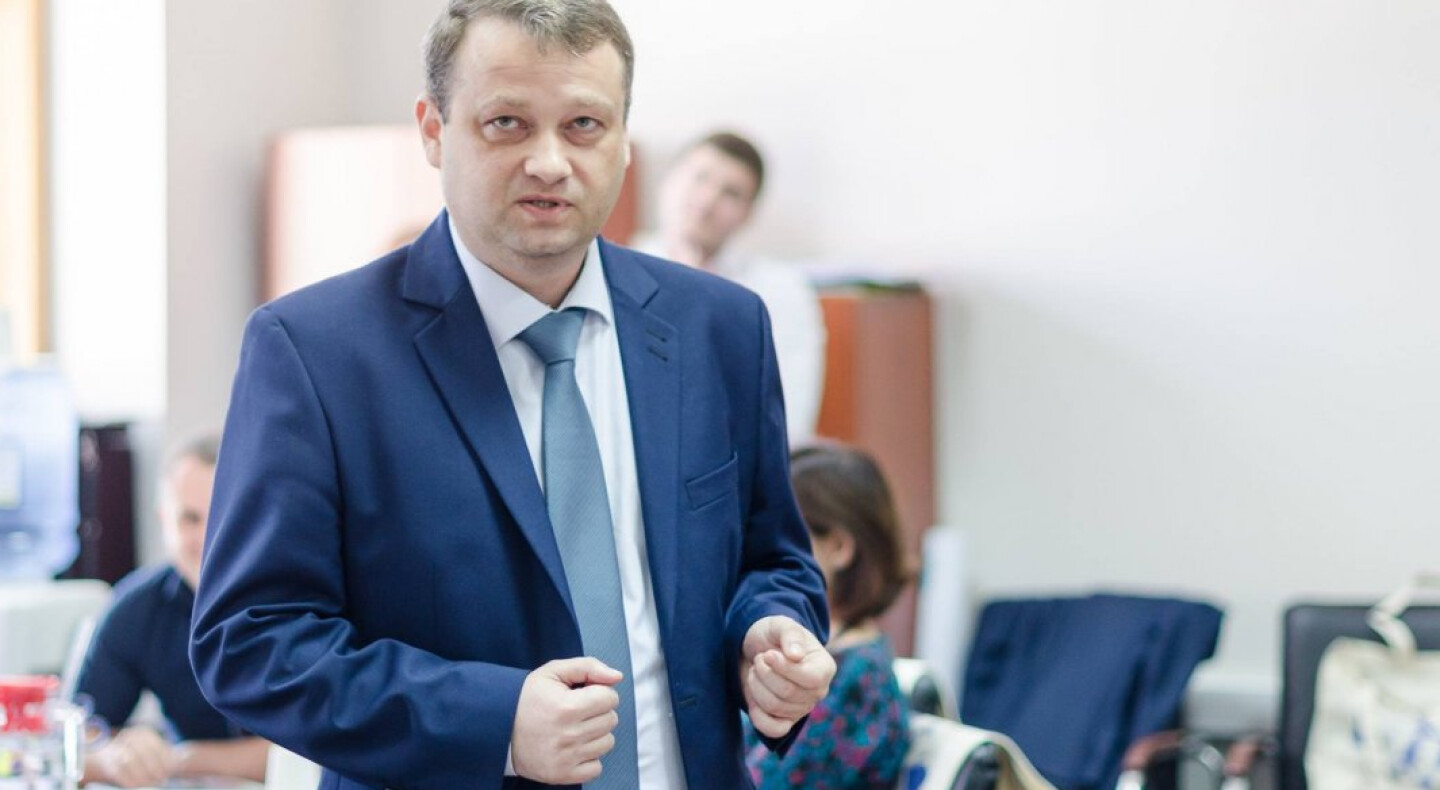
Since the 1990s, we’ve been in contact with many groups of oppressed nations, and they have constantly requested that we share our experience with them in the framework of the Free Nations of Post-Russia and other events in which we participated.
Particularly, the Chechen, Ingrian people, representatives of Bashkorstostan, Kalmykia, Yakutia, and Karelia were among our first university students in November 2023. Many of them are now in Ukraine or other free countries, while others remain in territories long occupied by Russia.
If new states emerge from Russia’s current territories, they will need to build governmental institutions from the ground up. This involves training personnel and developing the necessary expertise and competencies. Our educational project aims to provide this crucial knowledge and prepare potential leaders for the challenges of nation-building.

Is the Ukrainian government involved in this project? If not, does the University align with any specific government policies?
Until recently, there was no unified policy regarding peoples subjugated by Russia. Ukraine is guided by international law and the principle of inviolability of other countries’ borders. However, since Russia has violated all norms of international law while turning them into a mockery, the question of changing state policy has indeed arisen.
Unfortunately, such is the nature of the Muscovite formation that it can only function through the expansion of its territory, imposing its state system, language, culture, and so on.
Throughout 2023, we’ve seen significant developments in Ukraine’s approach to this issue. The Ukrainian Parliament has taken several important steps:
- It adopted resolutions recognizing the Chechen people as subjugated and acknowledging the state of Ichkeria, including its exiled government structures outside Russia.
- Resolutions regarding the Circassian people have been registered.
- A resolution was passed concerning the subjugated Ingrian people.
Furthermore, the newly established Temporary Commission for Interaction with the Indigenous Peoples of Russia has been working on a draft bill to recognize subjugated peoples. These actions indicate that a coherent state policy supporting subjugated peoples is gradually taking shape in Ukraine.
University of Free Nations logo. Source: University of Free Nations
What do the students study and how? And what is the practical outcome that you’ve mentioned?
Our online program aimed to equip representatives of subjugated peoples with the knowledge and skills to defend their national rights and build their own statehood. It covered a range of essential topics:
- International law and peoples’ rights, focusing on the right to self-determination. One way or another, every representative of a subjugated people has to justify that their nation has the right to self-determination in accordance with universally recognized international law.
- State-building, including government structures and forms. We envisioned that each student, taking into account their unique national format, could see the project of national life that would be best for their nation.
- Contemporary socio-economic processes for functional national systems.
- Promotional campaigns and information operations. We covered advocating their position and convincing representatives of their own national group, conducting promotional campaigns, and informational operations to achieve the desired result.
- Digital security to ensure safe communication and data protection.
- Historical case studies, particularly the Ukrainian national liberation struggles of the 1950s. We tried to show the struggle of the Ukrainian people was carried out on our historical material: what were its successful cases of implementation, what were the unsuccessful cases, what lessons were learned, and what was done next.
The three-month course combined weekly theoretical and practical classes, case study discussions, and various assessments. Students also completed a final project geared towards practical implementation.
What poses a threat to human rights and democracy must be repaired, separated, and, excuse me, destroyed.
We established strict selection criteria that the knowledge we would provide should be applied in practice, not just for general information. Admission was by recommendation only, with representatives of subjugated peoples nominating trusted individuals whom we then verify.
I understand you also taught at the university. Could you share your overall impressions of this work?
As an associate professor with a PhD in legal sciences, I taught international law and state theory. I was impressed by the students’ professionalism and deep historical knowledge. Our students came from regions like Tatarstan, Karelia, and Yakutia, each with centuries-old histories of statehood that were later suppressed by Moscow. They quickly grasped new concepts and skillfully related them to their own political and historical traditions.
Could you highlight some of the most notable practical projects the students presented?
Representatives from Karelia proposed a comprehensive constitutional framework for a future independent Karelia. Their project integrated Karelia’s geographical position and historical connections with Scandinavia and the Finno-Ugric world. It included a structure of autonomous regions within Karelia, a plan for decolonization of Russia and de-Russification with a transitional period, and prospects for integration with the Nordic Council. It was quite interesting and promising because they worked through international constitutional experience, taking into account their political realities.

The Yakut project, on the other hand, addressed a challenge: how an independent Yakutia could manage its vast natural resources. Yakutia is one of Russia’s key resource bases but has a relatively small population. The project explored strategies for Yakutia to benefit from its resources post-independence, methods to avoid falling under new forms of colonization, and ways to utilize these resources for the benefit of the Yakut nation.
Some politicians are concerned about the control of natural resources, especially in Siberia, if Russia were to disintegrate. As someone closely involved with this topic, what’s your perspective on these concerns?
It’s good that they have started talking about this. When they do, they start building models, making forecasts, forming a vision of potential solutions. Simply dismissing the possibility prevents any progress. I’m confident that analytical centers, particularly in the US and Europe, are already modeling scenarios and seeking optimal paths forward.
We can draw from historical examples, such as the decolonization of British and French territories in Africa during the 1950s and 1960s. Similar questions arose then about promoting national statehood and exercising effective control over economic resources. The goal was to form modern states that could integrate into the global community with democratic systems.
The issue of Russia, since Russia is a member of the UN Security Council, is always muted.
This is what a safe world should be. And what poses a threat to human rights and democracy must be repaired, separated, and, excuse me, destroyed.
We often hear that the national self-awareness of peoples in Russia is quite low due to propaganda. Did the course participants share any problems or difficulties they face, such as a lack of support from their own people in this struggle?
Of course, there are difficulties due to propaganda, but also and lack of awareness. Let’s consider this globally: To what extent do world leaders perceive the possibility or necessity of the Russian empire’s collapse? This issue is now emerging on the agenda, which is the purpose of our work.
However, just a year or two ago, it wasn’t even conceivable.
A historical parallel can be drawn with 1991, when George H. W. Bush initially opposed Ukrainian independence, believing the Soviet Union needed to exist as a single custodian of nuclear weapons. We face a similar situation now with Russia and its nuclear arsenal, but excuse me, when a monkey with nuclear weapons is running around, it is clearly not a guarantor of nuclear security.
Russia’s potential disintegration may not come from external influence but from national entities within it striving for independence. This realization is only now beginning to emerge. The indigenous peoples, too, cannot imagine that Russia could fall. But when this issue comes to the fore, there is no doubt that it will become supported.
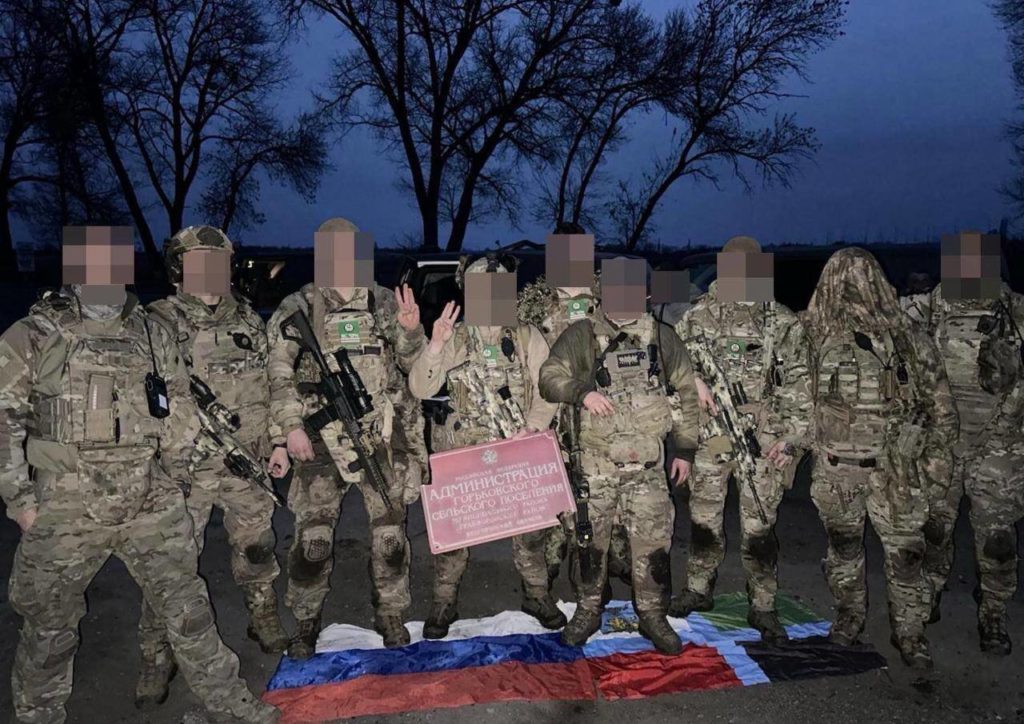
Are there any statistics on the percentage of people in Russia who identify as non-Russian or any data on the proportion of subjugated peoples?
Official census data in Russia is known to be distorted. According to these official figures, the Russian ethnic group predominates in most territories, but this is certainly not true.
Let’s take an example: Grayvoron, a city in Russia’s Belgorod region near the Ukrainian border, has a clearly Ukrainian name, and historically, these lands were part of the Sloboda Cossack regiments. The 1926 census showed an absolute majority of Ukrainians in this area. However, current statistics claim that Ukrainians make up no more than 5% of the population there.
This pattern of demographic manipulation can likely be extrapolated to other territories and national republics within Russia. The official data do not correspond to reality.
The University of Free Nations has also launched the “Freedom to Peoples” information campaign. What are the goals of this initiative?
Our initiative is unique in shaping the global information landscape regarding subjugated peoples within Russia, an issue often overlooked or buried due to prevalent Russian propaganda in Western countries.
While it’s generally acknowledged that the Russian Federation is a multinational state where national rights are frequently violated, this issue rarely receives the attention it deserves. Unlike human rights violations in other countries that are regularly addressed at the UN, the issue of Russia, since Russia is a member of the UN Security Council, is always muted.
Therefore, our task is to emphasize that there is a vast territory where the rights of nations are massively violated. And there are representatives of these nations who speak about it, who emphasize their cultural rights. And that every nation has the right to national self-determination.
Related:
- “Last colonial empire in Europe” must fall, nations subjugated by Russia call in Vilnius
- Disintegrated Russia will be nuke-free, nations subjugated by Moscow decide
- National minorities of Russia call to decolonize, denuclearize “imperial, terrorist” Russian state
- How Moscow hijacked the history of Ukraine-Rus
- Why Russia must be decolonized



